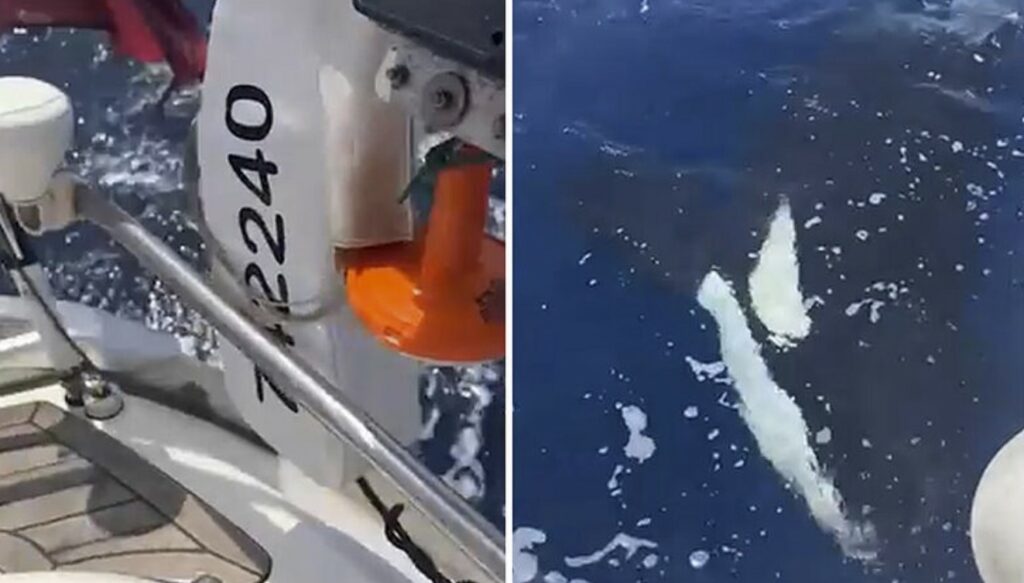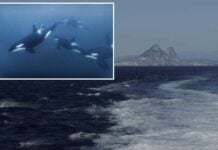
Orcas have attacked and sunk a third boat off the Iberian coast of Europe, and experts now believe the behavior is being copied by the rest of the population.
Three orcas (Orcinus orca), also known as killer whales, struck the yacht on the night of May 4 in the Strait of Gibraltar, off the coast of Spain, and pierced the rudder. “There were two smaller and one larger orca,” skipper Werner Schaufelberger told the German publication Yacht. “The little ones shook the rudder at the back while the big one repeatedly backed up and rammed the ship with full force from the side.”
Schaufelberger said he saw the smaller orcas imitate the larger one. “The two little orcas observed the bigger one’s technique and, with a slight run-up, they too slammed into the boat.” Spanish coast guards rescued the crew and towed the boat to Barbate, but it sank at the port entrance.
Two days earlier, a pod of six orcas assailed another sailboat navigating the strait. Greg Blackburn, who was aboard the vessel, looked on as a mother orca appeared to teach her calf how to charge into the rudder. “It was definitely some form of education, teaching going on,” Blackburn told 9news.
Reports of aggressive encounters with orcas off the Iberian coast began in May 2020 and are becoming more frequent, according to a study published June 2022 in the journal Marine Mammal Science. Assaults seem to be mainly directed at sailing boats and follow a clear pattern, with orcas approaching from the stern to strike the rudder, then losing interest once they have successfully stopped the boat.
“The reports of interactions have been continuous since 2020 in places where orcas are found, either in Galicia or in the Strait,” said co-author Alfredo López Fernandez, a biologist at the University of Aveiro in Portugal and representative of the Grupo de Trabajo Orca Atlántica, or Atlantic Orca Working Group.
Most encounters have been harmless, López Fernandez told Live Science in an email. “In more than 500 interaction events recorded since 2020 there are three sunken ships. We estimate that killer whales only touch one ship out of every hundred that sail through a location.”
The spike in aggression towards boats is a recent phenomenon, López Fernandez said. Researchers think that a traumatic event may have triggered a change in the behavior of one orca, which the rest of the population has learned to imitate.
“The orcas are doing this on purpose, of course, we don’t know the origin or the motivation, but defensive behavior based on trauma, as the origin of all this, gains more strength for us every day,” López Fernandez said.
Experts suspect that a female orca they call White Gladis suffered a “critical moment of agony” — a collision with a boat or entrapment during illegal fishing — that flipped a behavioral switch. “That traumatized orca is the one that started this behavior of physical contact with the boat,” López Fernandez said.
Orcas are social creatures that can easily learn and reproduce behaviors performed by others, according to the 2022 study. In the majority of reported cases, orcas have made a beeline for a boat’s rudder and either bitten, bent or broken it.
“We do not interpret that the orcas are teaching the young, although the behavior has spread to the young vertically, simply by imitation, and later horizontally among them, because they consider it something important in their lives,” López Fernandez said.
Stock up on iodine pills for the next nuclear disaster before it’s too late…
Orcas appear to perceive the behavior as advantageous, despite the risk they run by slamming into moving boat structures, López Fernandez added. Since the abnormal interactions began in 2020, four orcas belonging to a subpopulation living in Iberian waters have died, although their deaths cannot be directly linked to encounters with boats.
The unusual behavior could also be playful or what researchers call a “fad” — a behavior initiated by one or two individuals and temporarily picked up by others before it’s abandoned. “They are incredibly curious and playful animals and so this might be more of a play thing as opposed to an aggressive thing,” Deborah Giles, an orca researcher at the University of Washington and at the non-profit Wild Orca, told Live Science.
As the number of incidents grows, there is increased concern both for sailors and for the Iberian orca subpopulation, which is listed as critically endangered by the IUCN Red List. The last census, in 2011, recorded just 39 Iberian orcas, according to the 2022 study. “If this situation continues or intensifies, it could become a real concern for the mariners’ safety and a conservation issue for this endangered subpopulation of killer whales,” the researchers wrote.
FUNDRAISING: KEEP STRANGESOUNDS ONLINE!… THANK YOU FOR YOUR HELP! You can give through Credit cards, Debit cards and Paypal by using the form below. (You will get a gemstone gift for every donation above 50$! Send me your snail mail per e-mail)
You should also join my newsletter…YOU WILL LOVE IT…
I recommend following Qfiles for videos, podcasts and a wide compilation of alternative news…
 The following links feature products I recommend you to add to your preparedness plan to help and protect you and your family during an emergency:
The following links feature products I recommend you to add to your preparedness plan to help and protect you and your family during an emergency:
- Protect your home and car with the best lightning and EMP protection available…
- Use this filter to drink clean water at home!












Perhaps it’s more than that. Perhaps these creatures have intelligence that has never been measured and they can sense the metals in the water which are SRM (solar radiation management) aerosolized particles of Aluminum, Barium and Strontium sprayed from jet aircraft purposely and secretly over the entire globe. (Only God knows what else they spray on this earth, uh maybe the next plannedemic?) Perhaps the Orca’s know that mankind is destroying the earth and the oceans and their habitat and this is the only way they can lash out in objection and indignant retribution.
Well, there were babies around and the mother had a bad encounter with a boat before, says the article. So makes sense to me. She hates boats and is showing her babies so they hate them too. Pretty smart. Could be play or sport to attack the rudder too. They are badasses.
Well, who taught the first one?
Good job orcas
Has there been some sort of new engine technology being used in these boats around the same time as these attacks started becoming more frequent? Perhaps they are emitting a sound that we may not be able to hear, that the orcas are disturbed by, or that interferes with their ability to communicate with one another? Is there any sort pattern in the types of motors these boats have? Things to possibly look into.